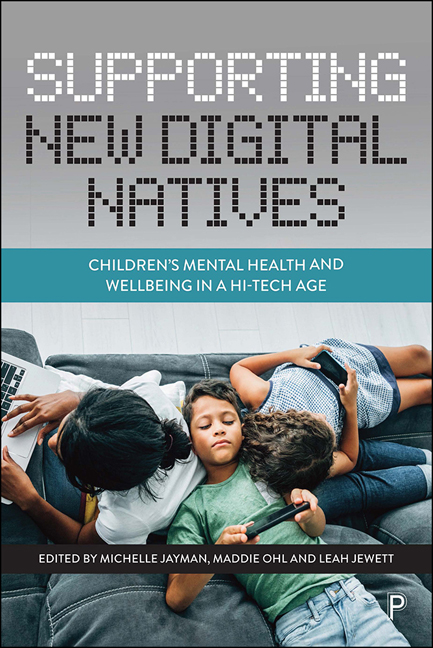Book contents
- Frontmatter
- Dedication
- Contents
- List of figures and tables
- Glossary
- Notes on contributors
- Foreword
- Preface
- 1 Digital lives: growing up in a hi-tech world and staying mentally healthy
- 2 Pyramid Club: building skills for healthy friendships and relationships in a digital age
- 3 Supporting children’s healthy socio-emotional development through play: Book of Beasties – the mental wellness card game
- 4 The School Counselling Partnership: providing support and promoting self-care for school communities
- 5 The Breeze Project: supporting children and young people through Forest School
- 6 Promoting the mental health of girls and young women in the community: the role of Girlguiding
- 7 Supporting families to navigate the changing sex-education landscape: Outspoken Sex Ed
- 8 The Lift Off programme by Red Balloon: online learning and wellbeing support for children who self-exclude from school
- 9 The LifeMosaic project: supporting wellbeing and empowering pupils through design, development and research
- 10 Building better mental wellbeing for children: rebel thinking and innovative practice
- Index
Foreword
Published online by Cambridge University Press: 13 May 2022
- Frontmatter
- Dedication
- Contents
- List of figures and tables
- Glossary
- Notes on contributors
- Foreword
- Preface
- 1 Digital lives: growing up in a hi-tech world and staying mentally healthy
- 2 Pyramid Club: building skills for healthy friendships and relationships in a digital age
- 3 Supporting children’s healthy socio-emotional development through play: Book of Beasties – the mental wellness card game
- 4 The School Counselling Partnership: providing support and promoting self-care for school communities
- 5 The Breeze Project: supporting children and young people through Forest School
- 6 Promoting the mental health of girls and young women in the community: the role of Girlguiding
- 7 Supporting families to navigate the changing sex-education landscape: Outspoken Sex Ed
- 8 The Lift Off programme by Red Balloon: online learning and wellbeing support for children who self-exclude from school
- 9 The LifeMosaic project: supporting wellbeing and empowering pupils through design, development and research
- 10 Building better mental wellbeing for children: rebel thinking and innovative practice
- Index
Summary
When I was first asked to write this foreword, the world was a very different place for all of us, and especially for our children. Even pre-pandemic, the need was there to help us understand and navigate tricky waters with the next generation – but now, more than ever, we need help to know what we should be doing, and how, in order to help our children to grow, stay safe and thrive.
Supporting New Digital Natives: Children's Mental Health and Wellbeing in a Hi-Tech Age pulls together insights into how children and young people can be active co-producers in shaping their learning experiences. Not only is it helpful for thinking about the role new digital natives play in their own educational journey and for supporting their mental health and wellbeing in today's rapidly changing virtual climate, but the varied and innovative interventions and initiatives it outlines will surely continue to inspire and have relevance down the line. It can speak to teachers, parents and carers, educators, social workers and others who work directly with the new digital native generation, and crucially it can help make a real difference to the lives of those children and young people.
This book is a guide to what matters most right now. As both a parent and a professional, I found it full of the ideas, support and reassurance I need both to grow with my children and colleagues and to look towards an uncertain future with more confidence. The jumping-off point of wellbeing in the digital age is a perfect one. It tackles, head on, the issues that feel most pressing in a world where as a mother of primary school aged children I’ve had to come to peace with the idea of days made up almost entirely of screen time. Whether my children are learning maths, doing PE, reading with their cousins or playing dolls with their friends, it's all done via a screen.
The first chapter is reassuring and practical, and sets the scene for the rest of the book. Each chapter that follows shares new ideas and approaches with clear explanation and real-world examples. There are golden threads that tie it all together, creating a book of many credible, kind voices which unite in their message of pragmatism and hope.
- Type
- Chapter
- Information
- Supporting New Digital NativesChildren's Mental Health and Wellbeing in a Hi-Tech Age, pp. xxvi - xxviiPublisher: Bristol University PressPrint publication year: 2021



